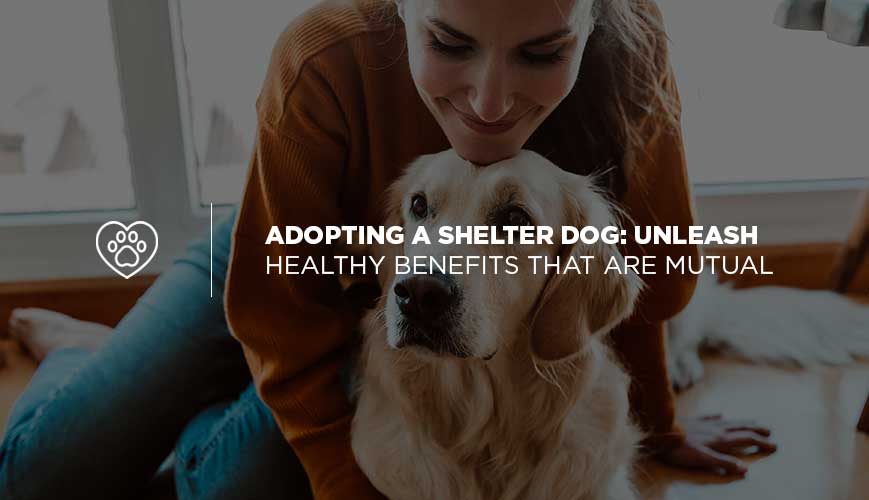Adopting a Shelter Dog: Unleash Healthy Benefits That Are Mutual
By Martha Michael

What’s great about adopting a shelter dog is the opportunity for an exponential return on your investment. An unwanted pet gets a home and the owner has the chance to gain benefits such as protection, security, and companionship that provides an enormous boost to mental health. If your new member of the family has a sweet temperament, you can maximize your impact by turning your pet into a therapy dog.
More Dogs Need Homes
If you have a soft spot for the furry ones, it’s easy to help -- you can contribute to a dog shelter near you or become fully invested and take one home. The ASPCA has a nationwide database where you can search using your zip code to find available dogs.
You can input the breed, the gender, and the distance from your house as well as other categories, including:
- Good with cats, dogs, or children
- Size, ranging from small to extra large
- Age of dog, from baby to senior
- House-trained
- Declawed
- Special needs
- Opportunity to provide foster care
The number of pets needing homes can seem astronomical, though it has declined over the last decade. Of the 6.3 million companion animals in shelters, approximately half are canines, but 390,000 shelter dogs are euthanized each year.
There’s good news, thanks to a greater use of the internet. About 2 million dogs are adopted annually and 710,000 stray dogs are returned to their owners. Of the 44 percent of American households with a dog and 35 percent with a cat, most are acquired through word of mouth.
Sadly, some adoptions lead to rehoming by people who can’t maintain the responsibility, typically because their animal develops a health issue or the owner has problems with the pet’s behavior, such as aggressive tendencies.
Therapy Dog
While dog adoption certainly gives a canine a new lease on life, the benefits can also impact their human counterpart and multiply to the community at large. Therapy dogs bring comfort to patients in hospitals and support to children struggling to read through pet partner programs in which they read to the dog. They accompany their owners to visit retirement homes, schools, or other venues to improve someone else’s quality of life.
The American Kennel Club designed an AKC Therapy Dog program to recognize the work of dogs and their owners who complete the certification requirements. They earn titles on a scale of completion beginning with AKC Therapy Dog Novice when they’ve completed 10 visits. They receive the highest honor, the AKC Therapy Dog Distinguished Award, after 400 visits.
For 30 years, Alliance of Therapy Dogs, or ATD, has certified teams of canines and their handlers, providing testing, registration, and support for volunteers engaging in animal-assisted activities. The group’s mission is to expand the network of individuals caring for others who can use the assistance of a therapy dog visit.
The facilities that access the network of therapy dog teams include:
- Mental health institutions
- Schools
- Hospice venues
- Cancer centers
- Rehab facilities
- Assisted living residences
- Patients’ homes
- Airports
The ATD testing process includes dog handling and an assessment of the dog’s temperament to minimize safety concerns. The most effective teams inspire smiles and lighten the emotional burdens experienced by those who are in challenging circumstances.
Finding Your Humane Spirit
Because dog adoption is a big commitment, you’re wise to strongly consider if it’s a good idea for you. If you don’t have the time to nurture and train a dog, you can still contribute by donating money or seeking out a local shelter to offer your assistance.
An article posted by TV station WYMT in Kentucky suggests other ways to support your local shelter. You can assume that nearly every nonprofit animal group typically needs money for operations, but they can use supplies as well. Some accept dog treats and equipment such as leashes and chew toys.
“A shelter dog, a rescue dog, is the most grateful animal in the world,” says Annie Fox, chairman of Friends of the Shelter in Harlan County, Ky. “They know they’ve been given a second chance and if you give them time to acclimate to your household, your family, you can just see them blossom.”
If your self-care routine keeps your attention trained on your down dog, not the needs of a shelter dog, it’s something you may consider. Keep in mind that the value of providing a home for a loving pet often benefits both parties. Offering your resources, whether that’s time, money, or attention is a way to increase the “pawsitive” impact you have on the world. And that’s something to bark about.
The information, including but not limited to, text, graphics, images and other material contained on this page are for informational purposes only. The purpose of this post is to promote broad consumer understanding and knowledge of various health topics, including but not limited to the benefits of chiropractic care, exercise and nutrition. It is not intended to provide or be a substitute for professional medical advice, diagnosis or treatment. Always seek the advice of your chiropractor, physician or other qualified health care provider with any questions you may have regarding a medical condition or treatment and before undertaking a new health care regimen, and never disregard professional medical advice or delay in seeking it because of something you have read on this page.